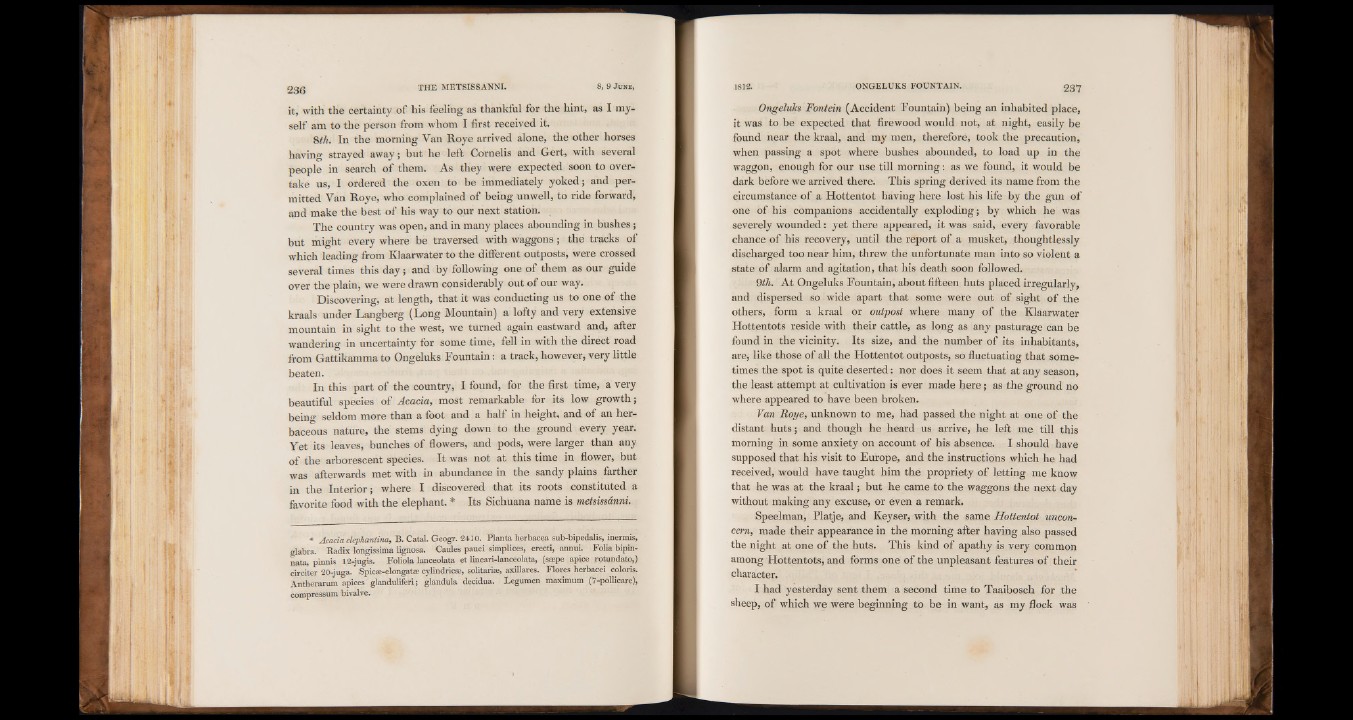
it, with the certainty of his feeling as thankful for the hint, as I myself
am to the person from whom I first received it.
8th. In the morning Van Iloye arrived alone, the other horses
having strayed away; but he left Cornelis and Gert, with several
people in search of them. As they were expected soon to overtake
us, I ordered the oxen to be immediately yoked; and permitted
Van Hove, who complained of being unwell, to ride forward,
and make the best of his way to our next station.
The country was open, and in many places abounding in bushes;
but might every where be traversed with waggons; the tracks of
which leading from Klaarwater to the different outposts, were crossed
several times this day; and by following one of them as our guide
over the plain, we were drawn considerably out of our way.
Discovering, at length, that it was conducting us to one of the
kraals under Langberg (Long Mountain) a lofty and very extensive
mountain in sight to the west, we turned again eastward and, after
wandering in uncertainty for some time, fell in with the direct road
from Gattikamma to Ongeluks Fountain: a track, however, very little
beaten.
In this part of the country, I found, for the first time, a very
beautiful species of Acacia, most remarkable for its low growth;
being seldom more than a foot and a half in height, and of an herbaceous
nature, the stems dying down to the ground every year.
Yet its leaves, bunches of flowers, and pods, were larger than any
of the arborescent species. It was not at this time in flower, but
was afterwards met with in abundance in the sandy plains farther
in the Interior; where I discovered that its roots constituted a
favorite food with the elephant. * Its Sichuana name is metsmanni.
* Acacia elephantina, B. Catal. Geogr. 2410. Planta herbácea sub-bipedalis, inermis,
glabra. Radix longissima lignosa. Caules pauci simplices, erecti, annui. Folia bipin-
nata, pinnis 12-jugis. Foliola lanceolata et liueari-lanceolata, (ssepe apice rotundato,)
circiter 20-juga. Spicve-elongatae cyiindricie, solitarias, axillares. Flores herbacei colorís.
Antherarum ápices glanduliferi; glándula decidua. Legumen máximum (7-poUicare),
compressum bivalve.
Ongeluks Fontein (Accident Fountain) being an inhabited place,
it was to be expected that firewood would not, at night, easily be
found near the kraal, and my men, therefore, took the precaution,
when passing a spot where bushes abounded, to load up in the
waggon, enough for our use till morning: as we found, it would be
dark before we arrived there. This spring derived its name from the
circumstance of a Hottentot having here lost his life by the gun of
one of his companions accidentally exploding; by which he was
severely wounded: yet there appeared, it was said, every favorable
chance of his recovery, until the report of a musket, thoughtlessly
discharged too near him, threw the unfortunate man into so violent a
state of alarm and agitation, that his death soon followed.
9th. At Ongeluks Fountain, about fifteen huts placed irregularly,
and dispersed so wide apart that some were out of sight of the
others, form a kraal or outpost where many of the Klaarwater
Hottentots reside with their cattle, as long as any pasturage can be
found in the vicinity. Its size, and the number of its inhabitants,
are, like those of all the Hottentot outposts, so fluctuating that sometimes
the spot is quite deserted: nor does it seem that at any season,
the least attempt at cultivation is ever made here; as the ground no
where appeared to have been broken.
Van Rope, unknown to me, had passed the night at one of the
distant huts; and though he heard us arrive, he left me till this
morning in some anxiety on account of his absence. I should have
supposed that his visit to Europe, and the instructions which he had
received, would have taught him the propriety of letting me know
that he was at the kraal; but he came to the waggons the next day
without making any excuse, or even a remark.
Speelman, Platje, and Keyser, with the same Hottentot unconcern,
made their appearance in the morning after having also passed
the night at one of the huts. This kind of apathy is very common
among Hottentots, and forms one of the unpleasant features of their
character.
I had yesterday sent them a second time to Taaibosch for the
sheep, of which we were beginning to be in want, as my flock was